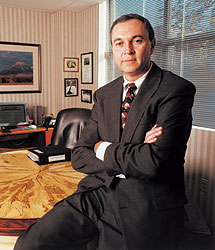Expert Panel Hears Biosafety Lab Concerns
Public hearing brings critics to State House

Opponents of the National Emerging Infectious Diseases Laboratories (NEIDL) being built on the BU Medical Campus cited concerns — ranging from disregard for an environmental justice community to fear that the lab will be used to devise bioweapons — during a public meeting on Friday with a Blue Ribbon Panel of experts appointed by the National Institutes of Health. The panel’s goal is to determine the scope of the environmental risk assessment that will be completed before the lab is opened.
Spokespeople for the Boston University Medical Center, which is building the lab with a grant from the NIH, have repeatedly stated that the facility will not be used to develop bioweapons, and will be used to study dangerous infectious diseases and develop diagnostic tests, treatments, and vaccines.
The three-hour meeting in the Gardner Auditorium at the Massachusetts State House, intended to solicit public comment, was expected to draw heavy criticism from community activists who have battled the project for years. Heather Spurlock Kennealy, an attorney who works with the Conservation Law Foundation, a longtime critic of the project, urged the panel to consider whether the city needs this lab, and if the money spent on pathogen research might be better spent on public health issues.
Chuck Turner, a Boston City Councilor representing District 7, said the lab was an example of excess of the war on terror. “It’s time to go back to the NIH and say let’s stop this nonsense,” said Turner. “The people of Boston have had too many lies and too much deception.”
Several people, most representing trade associations or the biotechnology industry, voiced support for the NEIDL. George Donahue, a business agent for Plumbers and Gasfitters Local 12, argued that the project would “provide good paying jobs for the residents of Boston.” After several speakers said the hiring of minority workers for the project was lacking, Donahue defended the project’s hiring record as “up to snuff.”
Mark Klempner, the associate provost for research at BUMC and the principal investigator for the project, told the panel that there are six other operational Biosafety Level 4 laboratories located in the United States and a seventh in Canada, and that in more than 85 years of combined operations of the labs, there has never been a community incident or an environmental release. Klempner said he is confident that BUMC is the best location for this laboratory, and that the center’s experienced researchers and infrastructure teams will contribute to what will be the safest laboratory of its kind in the nation and an important contributor to our nation’s public health.
The meeting’s remarks were addressed to 13 members of the 16-member Blue Ribbon panel, appointed by the NIH in March to advise the agency about what kind of risk assessment should be conducted. The panel is chaired by Adel Mahmoud, a senior molecular biologist at the Woodrow Wilson School of Public and International Affairs at Princeton University, and includes experts in infectious diseases, public health and epidemiology, risk assessment, environmental justice, risk communications, biodefense, biosafety, and infectious disease modeling. It was created after a committee of scientists convened by the National Academy of Sciences (NAS) concluded that an earlier risk assessment conducted by NIH did not adequately identify worst-case scenarios, and failed to provide sufficient information to compare the risks associated with alternative locations.
Panel chair Mahmoud told the audience that the panel’s advice, which would include consideration of the day’s comments, would be conveyed to the NIH at a meeting in Bethesda, Md., on June 6. Mahmoud urged those who had more to say to send e-mails to NIH_BRP@od.nih.gov, or mail letters to: NIH Blue Ribbon Panel, National Institutes of Health, 6705 Rockledge Drive, Suite 700, MSC 7985, Bethesda, Maryland 20892.

Comments & Discussion
Boston University moderates comments to facilitate an informed, substantive, civil conversation. Abusive, profane, self-promotional, misleading, incoherent or off-topic comments will be rejected. Moderators are staffed during regular business hours (EST) and can only accept comments written in English. Statistics or facts must include a citation or a link to the citation.